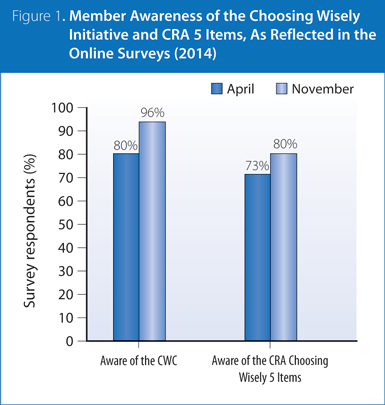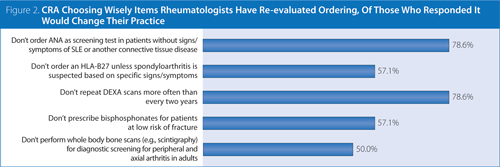Spring 2015 (Volume 25, Number 1)
Update on the CRA Choosing Wisely Campaign
By Michelle Jung, MD, FRCPC; and Shirley Chow, MD, FRCPC; on behalf of the CRA Choosing Wisely Dissemination Committee
Download PDF
Medicine, and in particular rheumatology, is a rapidly growing field with new tests and therapies being developed to improve patient care. As self-regulated professionals, we acknowledge our foremost obligation is to provide safe, efficient and effective care, while also respecting the fiscal constraints of our medical system.1 Although a difficult task, it can be achieved by reflecting on our own practices, keeping up-to-date on evidence, and ensuring that our approach is devoid of unnecessary investigations, procedures, and treatments. This reflection and improvement are the principles of the Choosing Wisely Canada (CWC) campaign.
The CWC campaign began last spring to help physicians and patients make decisions about medical care that is effective, safe, evidence-based, and mindful of resource stewardship.2 The CRA has joined the campaign alongside the Canadian Medical Association (CMA) and nineteen other Canadian medical societies. The CRA released a list of five rheumatology practices, therapies, or procedures which, based on current literature,3 may be unnecessary and/or expose patients to harm.
The CRA has recently conducted two surveys to evaluate the dissemination of the CWC campaign. The first was sent during the month the list was released and the second six months after.

Figure 1 reflects member awareness of this initiative (80% from the first survey, 96% from the second) and the CRA lists (73% from the first survey, 80% from the second). The number of people who thought it would change their practice was 25%. One explanation for why practice was not changed is that 91% of rheumatologists stated they are already compliant with these recommendations; 6% felt that family physicians should be changing their practice accordingly. Others stated that these recommendations did not apply to their practice (5%), while others needed more evidence (5%).

Click here to view larger version of the figure
The two most common investigations the CRA members would order differently (Figure 2) were the ANA test (68%) and bone mineral density (BMD) testing (64%).
This important act of optimizing patient safety and value in medical care is reflected in the incorporation of quality improvement and patient safety in the CanMEDS 2015 competencies.4 Our multifaceted roles as medical experts, health advocates, professionals, and managers is centred in our commitment to continuously improve health care quality, patient safety, and resource stewardship. As self-regulated professionals, we are accountable to the patient and committed to provide a safe and sustainable health care system. The motto is, “everyone in healthcare has two jobs when they come to work every day: to do their work and to improve it.”5
References
1. Feature: The Right Test at the Right Time: Striking the Proper Balance. CMPA Perspective 2014; 6(3):10-1. Available at: www.cmpa-acpm.ca/documents/10179/301526572/
com_2014_Perspective_Sept-e.pdf.
2. Choosing Wisely Canada in Partnership with the Canadian Medical Association.
Five Things Physicians and Patients Should Question, 2014. Available at: www.choosingwiselycanada.org/recommendations/rheumatology/.
3. Chow SL, Thorne JC, Bell MJ, et al. Choosing Wisely: The Canadian Rheumatology Association’s List of 5 Things Physicians and Patients should question. J Rheum 2014. In Press.
4. CanMeds 2015 Expert Working Group. Royal College of Physicians and Surgeons of Canada: Patient Safety and Quality Improvement Expert Working Group Report, 2014. Available at: www.royalcollege.ca/portal/page/portal/rc/common/documents/canmeds/
framework/patient_safety_ewg_report_e.pdf.
5. Batalden P, Davidoff F. What is “quality improvement” and how can it transform healthcare? Qual Saf Health Care 2007; 16:2-3.
Michelle Jung, MD, FRCPC
Post-Graduate Year 5 (PGY5) Rheumatology,
Department of Rheumatology,
Schulich School of Medicine and Dentistry
London, Ontario
Shirley Chow, MD, FRCPC
Assistant Professor,
Division of Rheumatology,
University of Toronto,
Toronto, Ontario |



